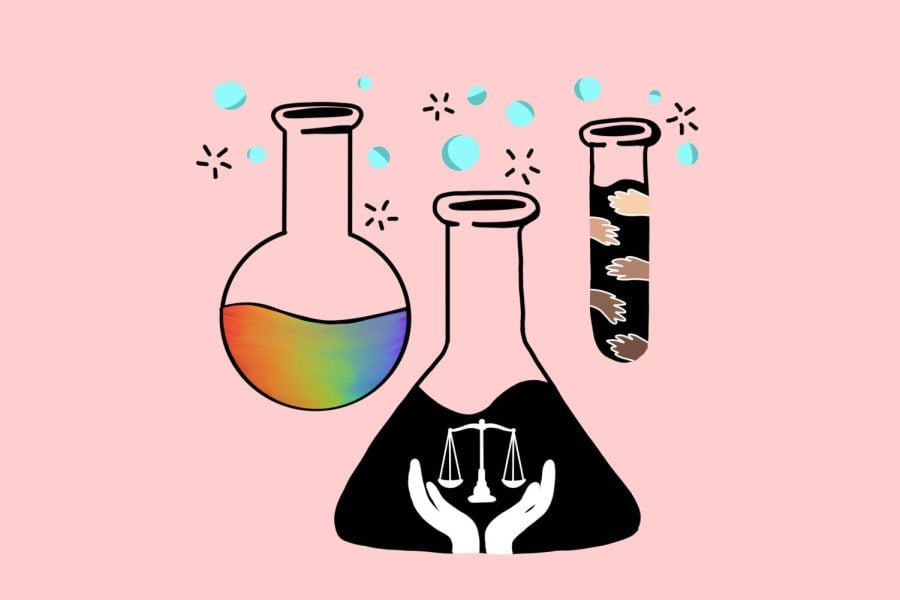‘I don’t think I’ve ever met a professor who’s as human’: Chemistry Prof. Stephanie Knezz champions inclusivity in STEM teaching
Chemistry Prof. Stephanie Knezz said she aims to center inclusivity in her STEM teaching.
April 9, 2023
Whenever chemistry Prof. Stephanie Knezz notices a chemical reaction is named after a white man, she usually makes a joke out of it in class.
“These guys were just doing the bare minimum and then naming things after themselves,” Knezz said.
Knezz said she aims to make a difference in her organic chemistry classes by talking about identity in her lectures. Science has a history of privileging white men, she said, which has caused structural problems in fields ranging from medicine to engineering.
Being open about her identity as a queer woman is one way Knezz encourages students who are underrepresented in science to continue pursuing STEM. Although she said that her visibility helps a little, Knezz acknowledged that there was more work to be done within these fields.
“The fact that you have an identity that’s not well represented actually means that it’s even more important that you continue in whatever field you are pursuing,” Knezz said. “We need the demographics of these fields to change in order to progress past a lot of the problems that we have.”
In the classroom, Knezz said, learners from marginalized backgrounds can feel isolated.
“Stereotype threat” — when people conform to preconceptions about their identities — and “impostor phenomenon” dissuade those from historically oppressed backgrounds from pursuing STEM, Knezz said. She added that if she had known about these terms in graduate school, she would have felt more validated in her learning struggles.
“I saw why a lot of people are scared by science classes, because I did have some experiences in classes where I was very scared and I did think that I was not going to pass them,” Knezz said.
Because of her experiences, Knezz said she strives to make classes joyful rather than competitive. She hopes to lessen the fear students can feel when taking organic chemistry, especially those from underrepresented backgrounds.
Weinberg freshman Preena Shroff said Knezz exudes confidence, yet remains understanding and empathetic toward students. Shroff added that during her experience in organic chemistry with Knezz, Knezz was relatable in a way other STEM professors were not.
“Dr. Knezz has opened up the gates for people who struggle to express themselves freely in male- or white-dominated fields,” Shroff said. “She’s opened that gate for them to feel more comfortable learning and growing.”
Bienen and Weinberg freshman Eddie Zhou agreed that Knezz’s organic chemistry classes felt more welcoming. Because of Knezz’s focus on inclusivity, he noticed people were more actively engaged in her lectures as opposed to the lectures he experienced during his first quarter of organic chemistry.
“(Knezz’s class) does feel like an environment where people are encouraged to participate and contribute,” Zhou said. “Nobody’s really left out and it is open for anyone to be a part of.”
Weinberg sophomore Julie Paska said she was initially daunted by organic chemistry, because she heard it caused students to drop out of the pre-med track and leave STEM altogether.
Paska added that she knew her identity as a low-income queer woman would put her at a disadvantage in STEM. However, she said her opinion about her ability to succeed changed because of the support she received from her organic chemistry professors, especially Knezz.
Paska said Knezz hosted frequent office hours and offered one-on-one sessions with students after class. That encouragement helped students like her feel more confident, she said.
Paska added it was a “blessing” to have been taught by Knezz, but also a “curse” because she will likely not have Knezz as a professor again.
“I don’t think I’ve ever met a professor who’s as human and as relatable as Prof. Knezz,” Paska said.
Email: [email protected]
Twitter: @beatricedvilla
Related Stories:
— Chemistry Prof. George Schatz wins Marsha I. Lester Award for Exemplary Impact in Physical Chemistry
— Chemistry Prof. Samuel Stupp awarded Bauerman Medal
— ‘He’s world class’: Chemistry Prof. Chad Mirkin continues to lead the way in nanotechnology research


